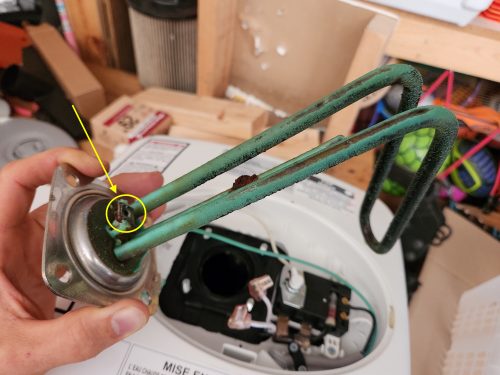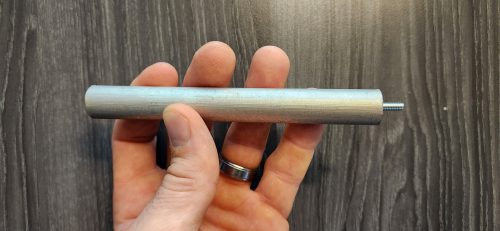I’ve had a point-of-use water heater leak on me twice now, and it was less than three years old both times. I shared those stories in a couple of blog posts: My kitchen disaster, and Kitchen disaster… averted!
I’m somewhat familiar with water heater warranties; I’ve helped many friends replace failed water heaters, many times within the warranty period, and it has never been a hassle. We’ve simply brought the water heater back to the original place of purchase, and the retailer has provided a replacement. Easy peasy. But not anymore.
No more Mr. Nice Guy
After my most recent water heater failure, I brought my 2.5-gallon, 2.5-year-old Bosch water heater back to the place of purchase with my receipt in hand, expecting to have the warranty honored there. I was quite surprised when they told me “no can do”. They’ve changed their return and warranty policies and insisted I would have to take this up with the manufacturer directly. So that’s what I did.
I contacted Bosch, and they just needed a few simple things from me to send out a new water heater. They needed proof of purchase: check. Proof of the leak: heck yes, I took a great video showing the leaking tank. And finally, a photo of the magnesium anode rod. Insert record scratch sound here.
Wait, what? You want a photo of the anode rod? Okay, sure, I can do that… but I don’t like where this is going.
So I took the water heater apart, and here’s what I found:
Do you see the problem? There’s NO ANODE ROD! In just 2.5 years, it has completely disintegrated away to nothing. Oof. That says a lot about the properties of my Maple Grove water. Here’s what a brand-new anode rod for a tiny water heater looks like:
No anode rod = no warranty
I sent the photo of my missing anode rod to Bosch, and their response was no surprise. Under the warranty fine print of items not covered, #8 says “Damage caused by lack of maintenance of anode rod.” And in the user manual, they have some stern warnings about maintaining the anode rod. Check it out:
It is critical that the anode rod be inspected once a year to detemine whether it requires replacement (and it must be replaced at least once every two years).
Wow. To inspect this anode rod, I need to uninstall the water heater completely, drain it, and take it apart. At that point, I don’t really care what the anode rod looks like. If I’m going through this much work, I will simply replace it right there and then. After all, new anode rods only cost about $10 apiece. So from now on, I intend to replace my water heater anode rod at least every year. I’ve already ordered a few replacement anode rods, and I’ll update this blog post every year with photos of my old anode rods to document the process.
Conclusion
Do all manufacturers have a super-restrictive warranty like this? No. When it comes to other brands, they’re not nearly as picky as Bosch about their anode rods. I checked the warranties for point-of-use water heaters from Rheem, Ariston, Eemax, and Ecosmart. Some say you “should” check the anode rod annually, but they don’t use words like “critical” and “must”. And most importantly, there’s no warranty exclusion related to the anode rod from any of them.
In short, the next time I purchase a point-of-use water heater, I won’t make the fatal assumption that all of the warranties are the same. But I already replaced this one, so I’ll be doing some serious annual maintenance on it until it leaks again.



Aaron
October 10, 2023, 8:44 am
Not that it matters for the warranty, of course — but do you think the disintegrated anode rod caused the leak? That is, is it worth it to do this maintenance on all water heaters regardless of warranty status?
Reuben Saltzman
October 10, 2023, 11:05 am
Hi Aaron, yes, I think if the water heater had an anode rod with anything left, my water heater wouldn’t have leaked.
But as for your second question, is it worth it to do this maintenance on all water heaters regardless of the warranty status? That’s an excellent question. I’ve been wondering this myself. I tried removing the anode rod on my 50-gallon water heater to see what condition it was in after a couple of years, and I couldn’t get it to budge with a socket wrench. I’ll have to try an impact driver. I’ll probably have a follow-up blog post on this topic in the near future, as well as a long-term experiment.
Patrick- northway home inspection
October 10, 2023, 9:06 am
That sounds crazy, I don’t think the average home owner would follow up with that much maintenance. I have a 20-year-old water heater at my rental property, pretty sure the anode rode is long gone there’s no way I would try to replace it. I’d be just asking for trouble on such an old piece of equipment.
Reuben Saltzman
October 10, 2023, 11:06 am
Patrick – agreed. And if you were to hire a plumber to do this maintenance, the cost of one single trip would probably exceed the cost of the water heater.